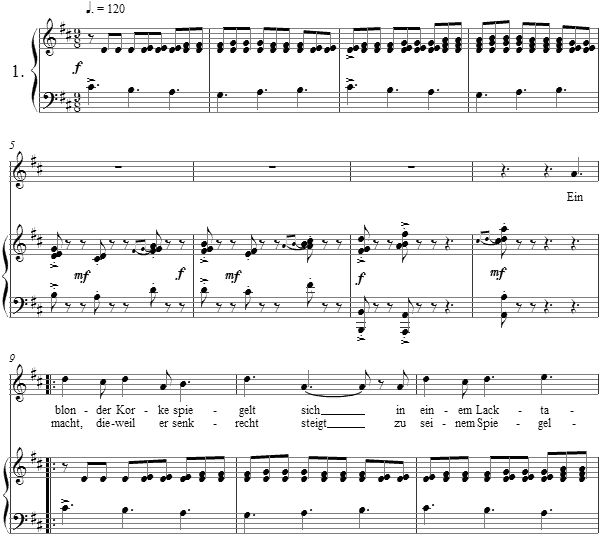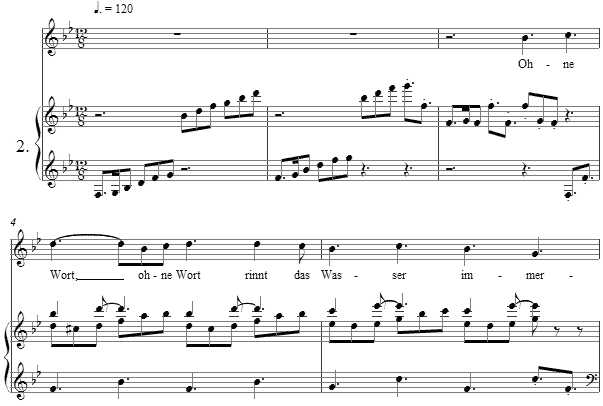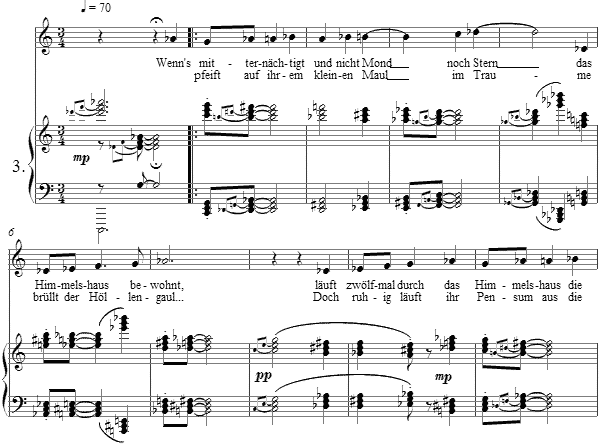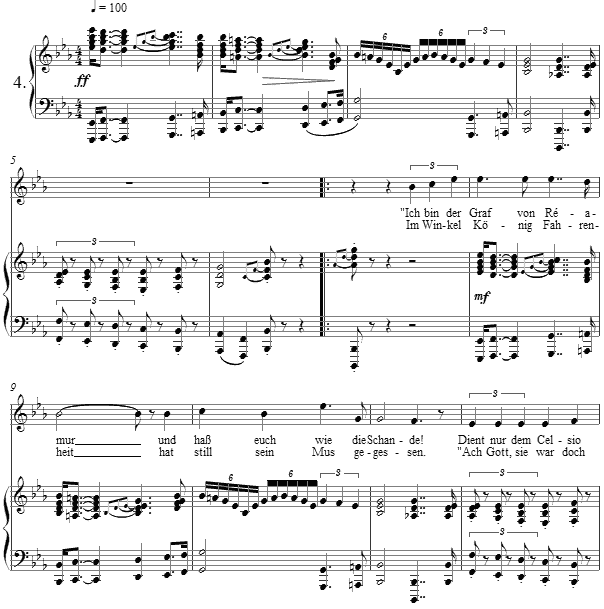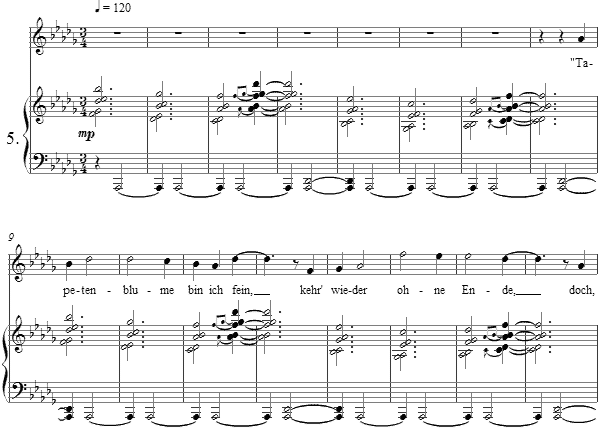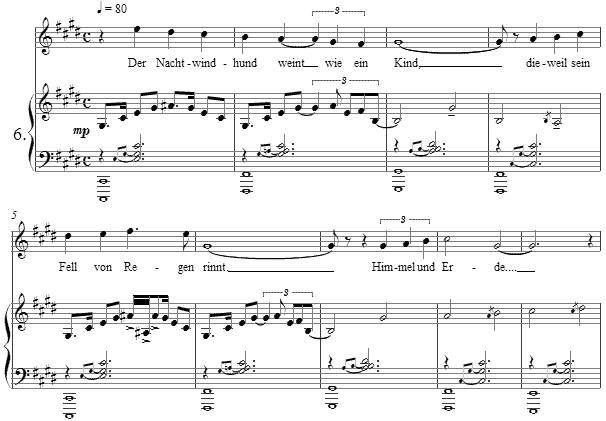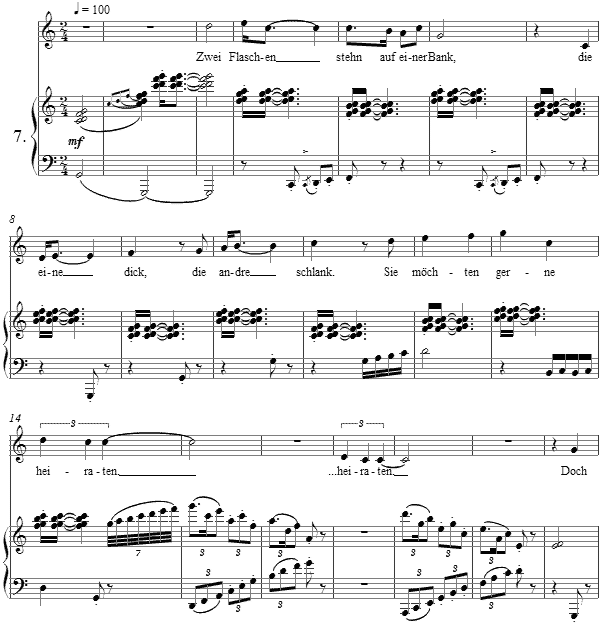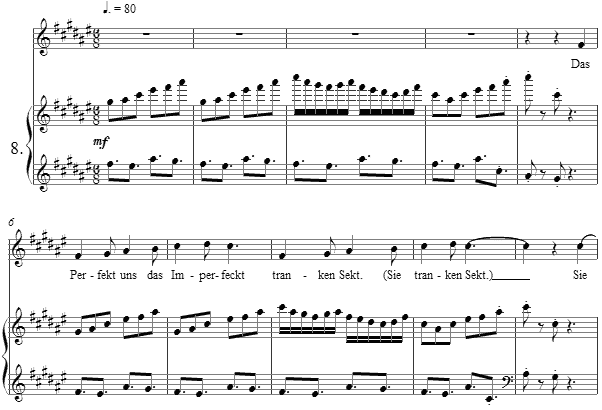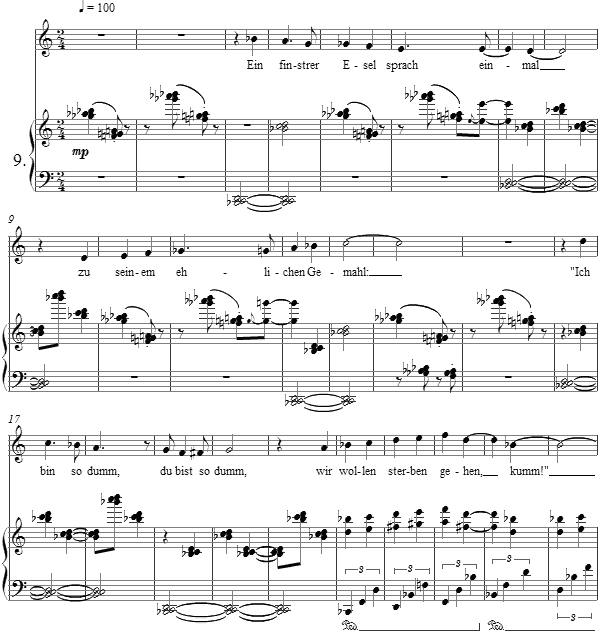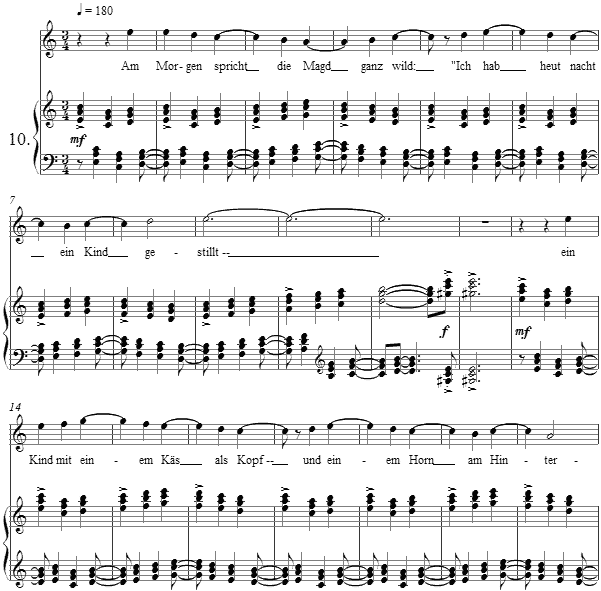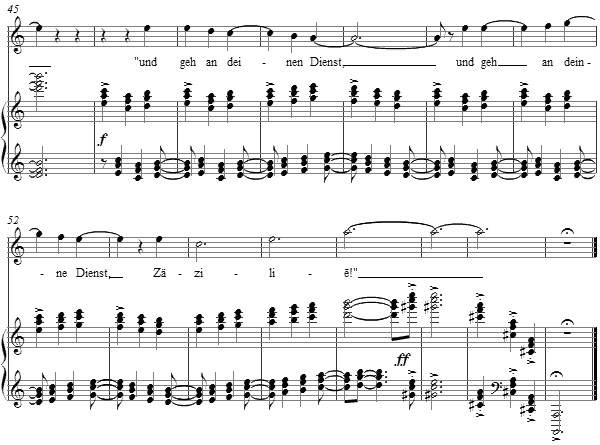Music and Texts of GARY BACHLUND
Vocal Music | Piano | Organ | Chamber Music | Orchestral | Articles and Commentary | Poems and Stories | Miscellany | FAQs
Zehn Morgenstern-lieder - (2010)
Christian Morgenstern
for soprano and piano
Anne Schwanewilms gewidmet
i. Das Lied vom blonden Korken [ 3 pages, circa 1' 35" ]
Ein blonder Korke spiegelt sich
in einem Lacktablett –
allein er säh’ sich dennoch nich,
selbst wenn er Augen hätt’!
Das macht, dieweil er senkrecht steigt
zu seinem Spiegelbild!
Wenn man ihn freilich seitwärts neigt,
zerfällt, war oben gilt.
O Mensch, gesetzt, du spiegelst dich
im, sagen wir, – im All!
Und senkrecht! – wärest du dann nich
ganz in demselben Fall?
ii. Das Wasser [ 3 pages, circa 1' 00" ]
Ohne Wort, ohne Wort
rinnt das Wasser immerfort;
andernfalls, andernfalls
spräch’ es doch nichts andres als:
Bier und Brot, Lieb und Treu, –
und das wäre auch nicht neu.
Dieses zeigt, dieses zeigt,
daß das Wasser besser schweigt.
iii. Der Mitternachtsmaus [ 2 pages, circa 2' 20" ]
Wenn’s mitternächtigt und nicht Mond
noch Stern das Himmelshaus bewohnt,
läuft zwölfmal durch das Himmelshaus
die Mitternachtsmaus.
Sie pfeift auf ihrem kleinen Maul, –
im Traume brüllt der Höllengaul…
Doch ruhig läuft ihr Pensum aus
die Mitternachtsmaus.
Ihr Herr, der große weiße Geist,
ist nämlich solche Nacht verreist.
Wohl ihm! Es hütet ihm sein Haus
die Mitternachtsmaus.
iv. Kronprätendenten [ 1 page, circa 1'00" ]
– „Ich bin der Graf von Réaumur
und hass’ euch wie die Schande!
Dient nur dem Celsio für und für,
Ihr Apostatenbande!“
Im Winkel König Fahrenheit
hat still sein Mus gegessen.
– „Ach Gott, sie war doch schön, die Zeit,
da man nach mir gemessen!“
v. Tapetenblume [ 2 pages, circa 1' 25" ]
"Tapetenblume bin ich fein,
kehr’ wieder ohne Ende,
doch, statt im Mai’n und Mondenschein,
auf jeder der vier Wände.
Du siehst mich nimmerdar genung,
so weit du blickst im Stübchen,
und folgst du mir per Rösselsprung –
wirst du verrückt, mein Liebchen."
vi. Himmel und Erde [ 2 pages, circa 1' 50"]
Der Nachtwindhund weint wie ein Kind,
dieweil sein Fell von Regen rinnt.
Jetzt jagt er wild das Neumondweib,
das hinflieht mit gebognem Leib.
Tief unten geht, ein dunkler Punkt,
querüberfeld ein Forstadjunkt.
vii. Die beiden Flaschen [ 3 pages, circa 1' 50" ]
Zwei Flaschen stehn auf einer Bank,
die eine dick, die andre schlank.
Sie möchten gerne heiraten.
Doch wer soll ihnen beiraten?
Mit ihrem Doppel-Auge leiden
sie auf zum blauen Firmament . . .
Doch niemand kommt herabgerennt
und kopuliert die beiden.
viii. Unter Zeiten [ 1 page, circa 30" ]
Das Perfekt und das Imperfekt
tranken Sekt.
Sie stießen aufs Futurum an
(was man wohl gelten lassen kann).
Plusquamper und Exaktfutur
blinzten nur.
ix. Die beiden Esel [ 2 pages, 1' 20" ]
Ein finstrer Esel sprach einmal
zu seinem ehlichen Gemahl:
„Ich bin so dumm, du bist so dumm,
wir wollen sterben gehen, kumm!“
Doch wie es kommt so öfter eben:
Die beiden blieben fröhlich leben.
x. Der Traum der Magd [ 2 pages, circa 1' 00" ]
Am Morgen spricht die Magd ganz wild:
Ich hab heut Nacht ein Kind gestillt –
ein Kind mit einem Käs als Kopf –
und einem Horn am Hinterschopf!
Das Horn, o denkt euch, war aus Salz
und ging zu essen, und dann –
„Halt’s –
halt’s Maul!“ so spricht die Frau,„und geh
an deinen Dienst, Zä-zi-li-e!“[ 21 pages, circa 13' 50" ]
Christian Morgenstern
Ten Morgenstern Songs (in rhymed paraphrase by the composer)
The texts all may be found in the collection, Galgenlieder. Morgenstern tells us, "The Galgenposesie is a work of worldly perspectives." So should we link all the following insights into a single strain of thought and piece of philosophical fabric -- which is colored by humor, humor and humor.
i. The Song of the blond Cork
A blond cork reflected on himself
By peering at a lacquered tray --
Alas he didn't see very much,
For without eyes he had no way!
Still, he would stand right straight up
In hopes of that mirrored view!
Of course when he was tilted sideways,
He would not spoil the precious brew.
O man, so frail, you see like him
In all things, shall we say!
And uprightly -- are you also then
Useful for a time, then tossed away?
Sequential building stacks of thirds add to an accompaniment, as the vocal line sings out the text of the fantastic fable. The moral of the tale is accompanied by a lighter harmonic rhythm as contrast to this eighth-note gesture. The setting ends as it begins, with a penultimate high A for the vocal line.
ii. Water
Without words, wordy words
Running water bubbles on;
Otherwise, yea otherwise
It would chatter dawn to dawn.
Beer and bread, love and care, --
Nothing new is said or sung.
All this shows is that water knows
It is best to hold one's tongue.
A running triple rhythm, sometimes stuttering into a duple punctuation portrays rushing, running water across a standard song form in a widely ranging accompaniment of arpeggios.
iii. The Midnight Mouse
When it's midnight and neither moon
Nor stars do light the sky,
Then twelve times across the heavens
The midnight mouse doth fly.
It squeaks with its tiny teeny mouth, --
In dreams howl the nags of hell . . .
Yet calmly, gently onward goes
This midnight mouse's spell.
Its lord, that spirit great and wise,
Leaves to it the night wind's care.
Take heed then! He watches o'er
The midnight mouse's lair.
In opposing motion, major triads close in upon each other, as the vocal line essays a seeming chromatic scale to cadence in D flat. The first verses yield to a contrasting section of polytonal color, D major against B flat major in open spacing, as the earlier D flat turns to function as the leading tone to a D major which yields back to the earlier harmonic colors before ending with C sharp against the final D.
iv. Pretender to the Throne
-"I am the Count of Réamur
and hate you for my shame!
Celsius is used for this, for that
As was your apostasy's aim!"
In the corner sat King Fahrenheit
And quietly supped with pleasure.
-"Oh God, those days were lovely, and
T'was thus, for I was the measure!"
In Morgenstern's era, Ibsen had completed his play with the same title and the politics of that period was also flavored with pretenders to various thrones. The poet makes a fine metaphor from this, placing this in the context of science. The Réaumur temperature scale was a measure of heat established in 1730 by the French naturalist René-Antoine Ferchault de Réaumur, with its zero set at the freezing point of water and the boiling point of water at normal atmospheric pressure set at the arbitrary number, 80. This Réaumur scale was rather widespread in Europe, but has disappeared by the eclipse of the Celsius and Fahrenheit scales, as well as the modern Kelvin measure to deal with what is now known as "absolute zero." The setting is a formal, two verse form solidly in E flat with the raised fourth of the scale flavoring some of the harmonic features.
v. Wallpaper Flowers
"I am a flower on the wallpaper's face,
And repeat from here to there;
While standing midst the birch leaves' green
On all the walls, a bloom so fair.
And yet you do not see me well enough,
While sitting with me above,
But gaze as if I were but some puzzle's fluff --
Have you gone mad, my love?"
This gentle setting relies on a long dominant and then tonic pedal, with parallel five-note chords above. The vocal line sings an unrequited love song.
vi. Heaven and Earth
The greyhound of night wails like a child,
As over its pelt rains run wild.
Then suddenly it hunts its Lady Moon,
That slowly flees in her broken swoon.
Yet worse than this image, dark with doom,
Comes a bureaucrat through the forest gloom.
A falling vocal line over an accompaniment as counterpoint to it captures darker harmonic colors in contrast with earlier settings. The poem's title serves within the vocal line as a comment and reminder of the highs and lows of life -- for which Morgenstern places the bureaucrat clearly in the latter category.
vii. Both Bottles
Two bottles sat together on a bench,
One thick boy and one thin wench.
They thought that they might wed,
But who'll advise? they asked instead.
Up into the sky of bluely blue
They gazed while suffering like me or you . . .
Ah! without advice forthcoming,
They relied instead on their plumbing.
A brighter C major with suspended chord forms and a "snap" rhythm accompany a simple bit of story telling. The verb which might gain some attention -- kopulieren -- was also often used in gardening, meaning to graft or splice together different stock -- though in Morgenstern's poem one might work hard to imagine the botanical meaning. I shall leave it up to you . . . .
viii. Under Tenses
The Perfect and the Imperfect drink
Some bubbly, as their glasses clink.
They toast the Future (and we think
This is a bright time to which to link).
The Pluperfect and Future Perfect
Wink for a fine effect.
A five measure long phrase accompanies the vocal line, each time one octave beneath the former, sinking to the final, deep cadence on F sharp major. The melody was suggested in part by "In dulci jubilo" which had played in a program on the radio earlier, for in "sweet jubilation" do there verb tenses celebrate our future. Amen.
ix. Mister and Missus Ass
A grim-faced ass spoke prayerfully
To his conjugal bride quite carefully:
"I am so dumb, you are so dumb,
We'll live our lives, then death with come."
But as the tale so oft will tell:
They were life-long happy, dumb yet well.
How often do we mortals question life with dark notions and visions of a future clouded by Angst? And yet, is not life wondrous, inexplicable and filled with joys? Morgenstern reminds of this in his small fable of Mister and Missus Ass, which is accompanied by some musical "hee-haw" as well as a long lined, final polytonal summation for each verse. The last verse ends with the repetition of the word, "dumb," as a nonsense syllable for the singer to end this sermon.
x. The Maiden's Dream
In the morning a maid spoke crazed and wild:
"I have this night breast-fed a child --
A child with a head made out of cheese --
And a horn showing from his hair, if you please!
That horn, o think, it was made of salt
And went off to eat, and" -- "Halt!"
"Hush that mouth!" said the Lady of the House, "but be
You off to your work, crazed Cecily!"
Solidly in A minor, parallel second-position triads make a tirade over which the vocal line sings out the panic of this dream. Parallel augmented triads accompany a middle section before the reprise of this gesture.
As summation to the dream, in particular, and the set of ten songs in general, the vocal line rises to a last high A, climax to both. A final, thumping repetition of the augmented triad puts a button on this setting.
Anne Schwanewilms
Soprano Anne Schwanewilms studied with Hans Sotin in Köln, and from 1991-96 was a member of the opera ensemble in Köln. Beginning as a mezzo, her first soprano role was Gutrune in Götterdämmerung for the 1996 Bayreuth Festival. Thereafter she came to specialize in the German Romantic repertory, earlier with Euryanthe, Elettra, Senta, Sieglinde and Leonore. Moving into lighter repertoire, she has sung Chrysothemis, Marschallin, Arabella, Ariadne, and Grete in Schreker's Der Ferne Klang. In 2002 she was named Singer of the Year by Opernwelt, and is also an accomplished and well-respected art song singer. Her website is: http://www.anneschwanewilms.com
In this winter with snow lying on the ground for weeks and my wife healing a broken foot after a fall, Anne came to the house to coach a few hours a day of Grete. She brought with her a lovely basket of champagne, wine, homemade tomato sauce, home-smoked salmon and more. For such generosity of spirit, goodwill and good humor, I hereby take our "revenge."
The score for Zehn Morgenstern-lieder is available as a free PDF download, though any major commercial performance or recording of the work is prohibited without prior arrangement with the composer. Click on the graphic below for this piano-vocal score.

